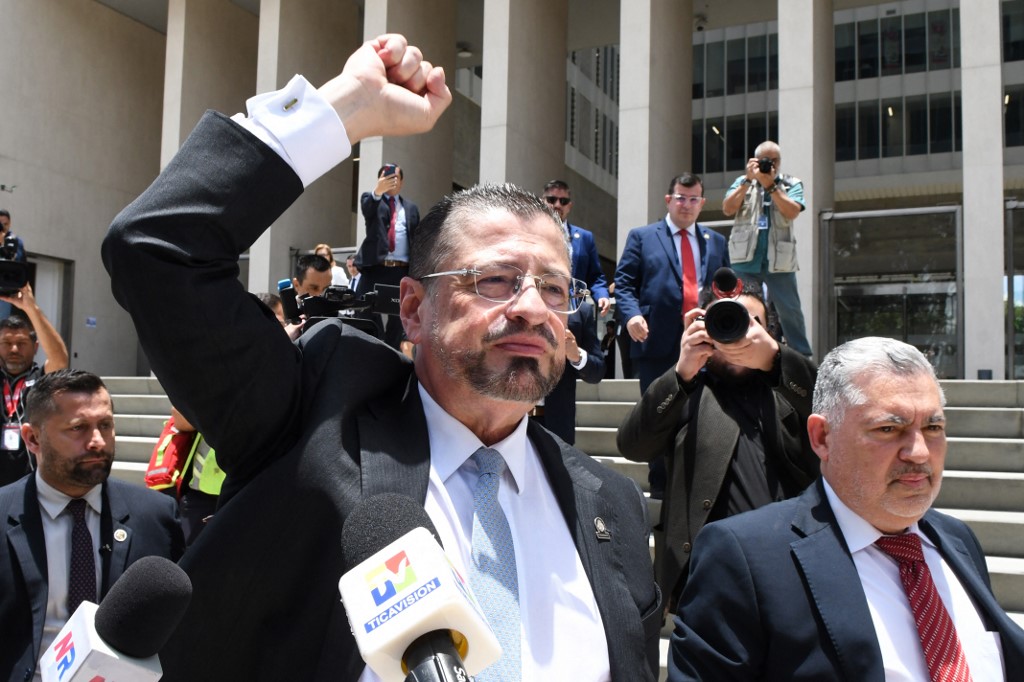Costa Rican President Rodrigo Chaves denounced today an “attempted judicial coup” as he appeared before a congressional committee that must recommend to the full chamber whether to strip him of his immunity so he can be tried for corruption.
The conservative leader, in power since 2022, is accused by the Prosecutor’s Office of the crime of extortion through abuse of power to benefit another person, which carries a penalty of up to eight years in prison.
This is the first time a president of Costa Rica has faced a request to lift immunity, which was approved by the Supreme Court on July 1. Now the unicameral Legislative Assembly, controlled by the opposition, must decide.
“Here I stand before you (…) literally facing an attempted judicial coup,” said Chaves, a 64-year-old economist, during his appearance before the parliamentary committee. Prosecutors accuse the president — a former World Bank official — of forcing a communications company contracted by the presidency to pay $32,000 to his friend and former image adviser, Federico Cruz.
According to the indictment, the hiring of the company to provide services during Chaves’s term, which ends next year, was funded by the Central American Bank for Economic Integration (CABEI) under an “apparently” improper procedure.
Rotten caste
Chaves, accused by critics of disregarding the separation of powers, described the case as a “setup” and “lies” by Attorney General Carlo Díaz. “Compatriots, do you really believe this case makes any sense, beyond the servility of an incompetent, clumsy prosecutor serving the care network that manipulates him?” Chaves asked.
The president added that after 36 years of service abroad, he now faces the country’s political elite, which he labeled a “rotten and corrupt caste.” He attributed the charges to “revenge, retaliation, and intimidation” orchestrated by the prosecutor and some judges because he has “routinely” denounced “corruption” and “abuses” in the judiciary.
Chaves’s lawyer, José Villalobos, who presented arguments to the committee after the president, insisted there was “no sufficient reason, no reasonable basis” to remove the president’s immunity. “For this defense, this indictment does not meet the minimum requirements for you to recommend lifting immunity,” Villalobos stated.
The hearing lasted about four hours, and afterward Chaves was greeted with cheers from hundreds of supporters outside the Assembly. “You are not alone!” his followers chanted, waving Costa Rican flags.
Minister of Culture
On July 1, the Full Court — composed of all Supreme Court justices — voted 15 in favor and 7 against “sending to the Legislative Assembly the request to lift the president’s immunity. The Full Court, which handles matters of great national importance, also asked to remove the immunity of the Minister of Culture, Jorge Rodríguez, on the same charges.
The legislative committee has until August 28 to issue a report recommending for or against lifting immunity. However, this deadline can be extended by up to 20 days if lawmakers consider it necessary.
Judicial and electoral authorities are also pursuing other investigations against Chaves for alleged irregular campaign financing and for interfering in the upcoming elections — scheduled for February 1, 2026 — which is prohibited by Costa Rican law.
The president, whose strongman populist profile resonates with part of the population, is legally barred from running for consecutive reelection. Even so, he has said he hopes his party will win a qualified majority in Congress in the 2026 elections to push through a series of reforms.
In press conferences and official events, Chaves frequently discredits opposition parties, judges, prosecutors, and lawmakers, and attacks the critical press. His detractors accuse him of an authoritarian drift.






